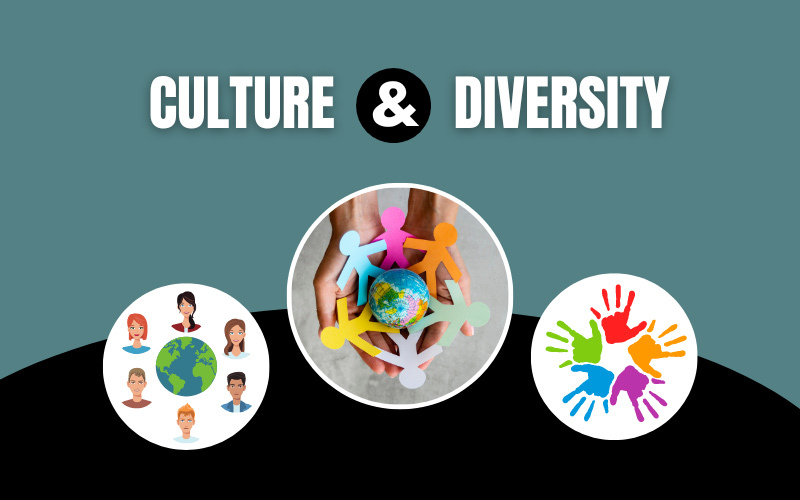Introduction
A wide phrase, culture can be thought of as our “way of being” and includes ideas, values, customs, and actions. Respecting cultural diversity with your behaviour is a good general rule.
Basically, cultural diversity is bringing people from various origins and cultures together and then fostering an atmosphere that not only acknowledges but also embraces the differences between those cultures and backgrounds. That makes it easier to create a setting where people can be completely authentic.
Understanding cultural diversity means realising that society is composed of a variety of groups, each with their own interests, talents, and needs. It also suggests that you are aware that people in society may have sexual and religious preferences that are dissimilar from your own.
Importance of Culture in different sectors
-
Culture in Workplace
Employers must educate themselves on the value of cultural diversity in the workplace if they want to operate a smooth, prejudice-free operation. Accepting diversity signifies people who are distinctive due to their race, language, religion, ethnicity, etc. from other cultures and societies.In the workplace, cultural diversity fosters inclusion and creates opportunities for improved employee collaboration. Businesses today recognise the value of ethnic diversity in boosting sales and brand recognition.
-
Culture in Educational institutions
Schools are crucial in developing students into mature, responsible adults. They can create a better learning environment that produces people who are compassionate and understanding of others. Diversity of culture is a necessary component of every classroom. Every school will include children from various cultural origins, so it is crucial that all pupils learn to embrace cultural diversity and develop into tomorrow’s dependable people.
-
Culture in Healthcare
Employers in the healthcare industry, their employees, and their patients all stand to gain greatly from workplace diversity. For healthcare professionals, diversity fosters a deeper sense of inclusion and community, which makes the workplace feel safer and more pleasurable. More than three out of four workers prefer diversified companies, according to surveys.Healthcare workers should be just as diverse as the patients they are caring for, if not more so. This enables us to guarantee that each person who enters the building will be met by a person who can relate to them, connect with them, and better address their individual requirements.
Share your views on culture and diversity with us on Write For Us Culture Category.
The Bottom Line
Multiculturalism has a lot of advantages. The key benefit is that it promotes tolerance and breaks down negative prejudices among various groups of people. This is crucial since, according to the UN, 1/3 of the world’s main wars include a cultural component.
Various cultures each have their own beliefs and pursuits, which they might combine to present different approaches to problems. Individuals from various cultures may provide us with unique insights into things like music, art, history, religion, language, and more.
It helps get rid of negative stereotypes and personal prejudices about different populations. Cultural diversity also makes it simpler to acknowledge and recognise “ways of being” that are not necessarily similar to our own. in order to interact with individuals and create bridges across cultural boundaries for respect, trust, and understanding.




